
"I Hear a Symphony" is a 1965 song recorded by the Supremes for the Motown label.

"I Will Survive" is a 1970s hit song recorded by American singer Gloria Gaynor, released in October 1978 by Polydor Records as the second single from her sixth album, Love Tracks (1978). It was written by Freddie Perren and Dino Fekaris. The song's lyrics describe the narrator's discovery of personal strength following an initially devastating breakup. The song is frequently regarded as an anthem of female empowerment, as well as a disco staple.
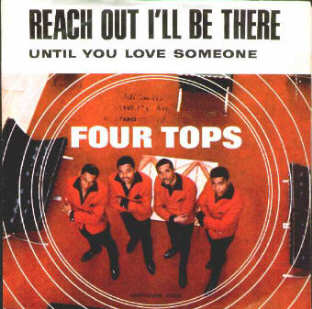
"Reach Out I'll Be There" (also formatted as "Reach Out (I'll Be There)") is a song recorded by American vocal quartet Four Tops from their fourth studio album, Reach Out (1967). Written and produced by Motown's main production team, Holland–Dozier–Holland, the song is one of the most widely-known Motown hits of the 1960s and is today considered the Four Tops' signature song.

"Blue Bayou" is a song written by Roy Orbison and Joe Melson. It was originally sung and recorded by Orbison, who had an international hit with his version in 1963. It later became Linda Ronstadt's signature song, with which she scored a Top 5 hit with her cover in 1977. Many others have since recorded the song.

"Badge" is a song written by Eric Clapton and George Harrison, and recorded by British rock music group Cream on their final album, Goodbye. Also issued as a single in March 1969, "Badge" peaked at number 18 in the UK Singles Chart and number 60 on the US Billboard Hot 100 chart.

"Never Can Say Goodbye" is a song written by Clifton Davis and originally recorded by the Jackson 5. The song was originally written and intended for the Supremes; however, Motown decided it would be better for the Jackson 5. It was the first single released from the group's 1971 album Maybe Tomorrow, and was one of the group's most successful records. It has been covered numerous times, most notably in 1974 by Gloria Gaynor and in 1987 by British pop group the Communards.
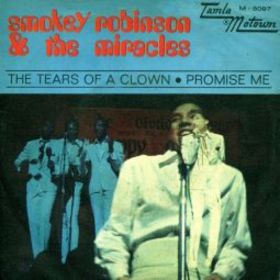
"The Tears of a Clown" is a song written by Hank Cosby, Smokey Robinson, and Stevie Wonder and originally recorded by Smokey Robinson & the Miracles for the Tamla Records label subsidiary of Motown, first appearing on the 1967 album Make It Happen. The track was re-released in the United Kingdom as a single in July 1970, and it became a number-one hit on the UK Singles Chart for the week ending September 12, 1970. Subsequently, Motown released a partially re-recorded and completely remixed version as a single in the United States as well, where it quickly became a number-one hit on both the Billboard Hot 100 and R&B Singles charts.

"It's Too Late" is a song from American singer-songwriter Carole King's second studio album, Tapestry (1971). Toni Stern wrote the lyrics and King wrote the music. It was released as a single in April 1971 and reached number 1 on the Billboard Hot 100 and Adult Contemporary charts. Sales were later platinum-certified by the RIAA. Billboard ranked "It's Too Late" and its fellow A-side, "I Feel the Earth Move", as the No. 3 record for 1971.
"Do You Hear What I Hear?" is a song written in October 1962, with lyrics by Noël Regney and music by Gloria Shayne. The pair, married at the time, wrote it as a plea for peace during the Cuban Missile Crisis. Regney had been invited by a record producer to write a Christmas song, but he was hesitant due to the commercialism of Christmas. It has sold tens of millions of copies and has been covered by hundreds of artists.
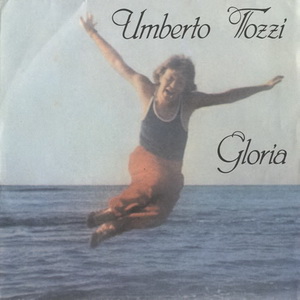
"Gloria" is a 1979 love song written and composed in Italian by Umberto Tozzi and Giancarlo Bigazzi, and first translated to English by Jonathan King. A 1982 cover version by American singer Laura Branigan, with different English lyrics, peaked at number two on the US Billboard Hot 100 and has been certified platinum by the Recording Industry Association of America (RIAA).
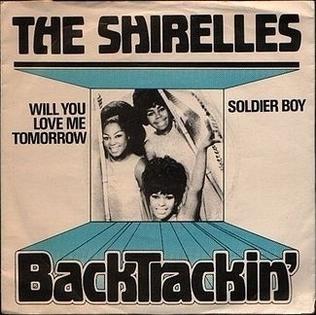
"Will You Love Me Tomorrow", sometimes known as "Will You Still Love Me Tomorrow", is a song written by Gerry Goffin and Carole King. It was first recorded in 1960 by the Shirelles; released as a single that November, it became the first song by an African-American girl group to top the Billboard Hot 100 chart. It has since been recorded by many other artists, including King on her 1971 album Tapestry.
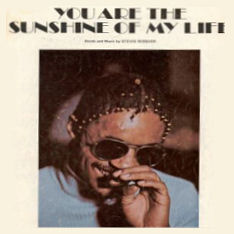
"You Are the Sunshine of My Life" is a 1973 single released by Stevie Wonder. The song became Wonder's third number-one single on the Billboard Hot 100 chart and his first number-one on the Easy Listening chart. It won Wonder a Grammy Award for Best Male Pop Vocal Performance, and was nominated for both Record of the Year and Song of the Year. This song was the second single released from the 1972 album entitled Talking Book, which stayed at number one on the R&B albums chart for three weeks.

"Something About You" is a single released by English jazz-funk band Level 42 in 1985, in advance of its inclusion on the album World Machine the same year. The song was written by Mark King, Mike Lindup, Phil Gould, Boon Gould, and Wally Badarou. Hugh Thompson sung backing vocals on the 12" remix.
Gloria Shayne Baker was an American composer and songwriter best known for composing the "Do You Hear What I Hear?" Christmas carol in 1962 with her then husband, Noël Regney.

"Lookin' for a Love" is a song written by J. W. Alexander and Zelda Samuels and was the debut hit of the family group the Valentinos, which featured Bobby Womack. The song was a hit for the Valentinos, climbing to number eight on the R&B chart and crossing over to number 72 on the Billboard Hot 100 in 1962, released on Sam Cooke's SAR label. The song became a much bigger hit when Womack issued a solo version in 1974; this version reached number one on the R&B chart and number ten on the Billboard Hot 100. As well, an interim version of "Lookin' for a Love" by the J. Geils Band in 1971 was a top-40 hit for them, peaking at number 39.

"When the Girl in Your Arms Is the Girl in Your Heart" is a 1961 hit by Cliff Richard written by the songwriting team of Sid Tepper and Roy Bennett who would contribute fifteen songs to the Cliff Richard canon including his career record "The Young Ones". Produced by Richard's regular producer Norrie Paramor, "When the Girl in Your Arms..." featured backing by the Norrie Paramor Orchestra. Richard's own group the Shadows backed him on the B-side "Got a Funny Feeling".
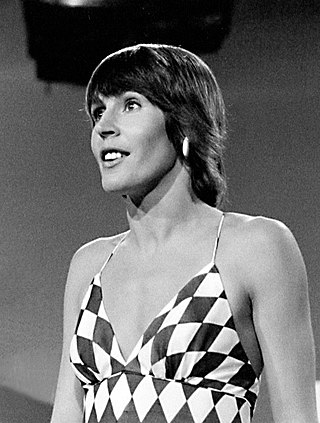
Australian-American singer Helen Reddy (1941–2020), often referred to as the "Queen of 70s Pop", recorded 18 studio albums, seven of which have achieved sales of 500,000 units in the US for which they were awarded Gold certification by the Recording Industry Association of America. One of those seven, I Am Woman, eventually went Platinum by reaching sales of one million copies, and her first compilation album, Helen Reddy's Greatest Hits, was awarded Double Platinum status in 1992 for hitting the two million sales mark. The respective US and Canadian album charts in Billboard and RPM magazine each had appearances by 10 of these LPs during the 1970s.

The singles discography of Elvis Presley began in 1954 with the release of his first commercial single, "That's All Right". Following his regional success with Sun Records, Presley was signed to RCA Victor on November 20, 1955. Presley's first single with RCA, "Heartbreak Hotel", was a worldwide hit, reaching the No. 1 position in four countries and the top 10 in many other countries. Other hit singles from the 1950s include "I Want You, I Need You, I Love You", "Don't Be Cruel", "Hound Dog", "Love Me Tender", "Too Much", "All Shook Up", "(Let Me Be Your) Teddy Bear", "Jailhouse Rock", "Don't", "Wear My Ring Around Your Neck", "Hard Headed Woman", "One Night", "(Now & Then There's) A Fool Such as I", and "A Big Hunk o' Love". On March 24, 1958, Presley entered the United States Army at Memphis, Tennessee, and was stationed in Germany. He left active duty on March 5, 1960.
"See the Funny Little Clown" is a song written and sung by Bobby Goldsboro, which he recorded on October 17, 1963 and released on November 18, 1963. In 1964, the song spent 13 weeks on the Billboard Hot 100 chart, peaking at No. 9, while reaching No. 3 on Billboard's Middle-Road Singles chart, No. 10 on the Cash Box Top 100, and No. 30 on Canada's CHUM Hit Parade.

"Her Royal Majesty" is a song written by Gerry Goffin and Carole King and performed by James Darren. The song was arranged and produced by Stu Phillips.

















